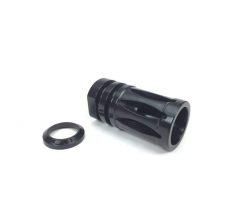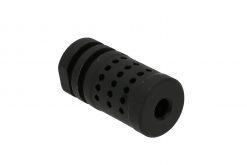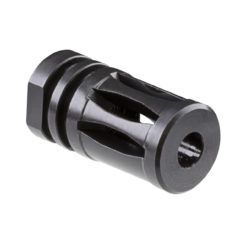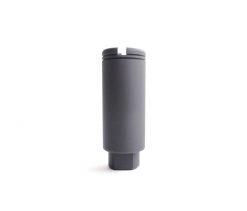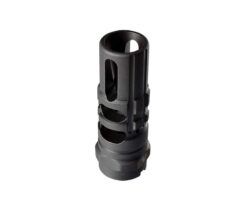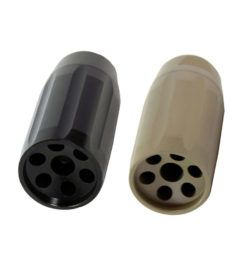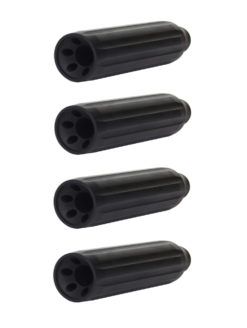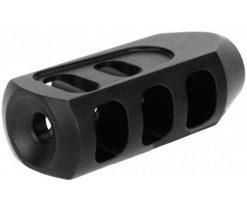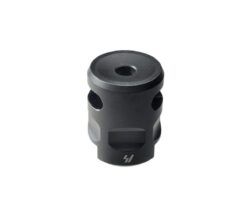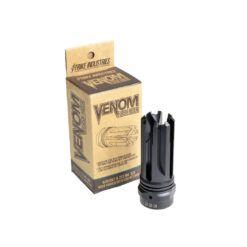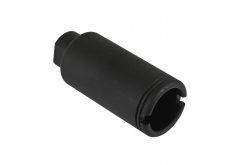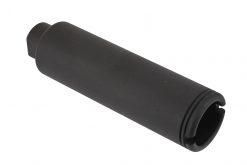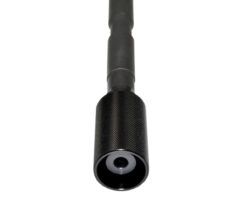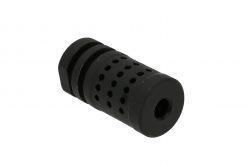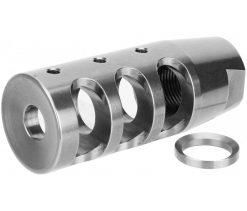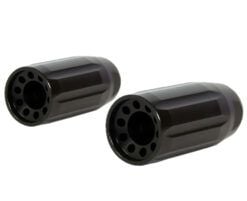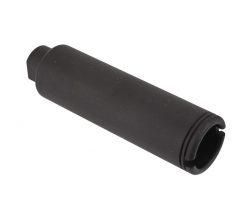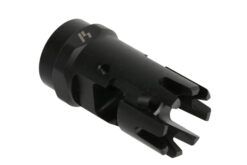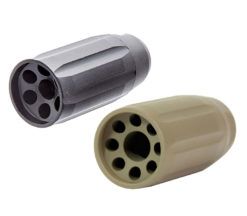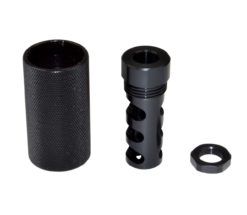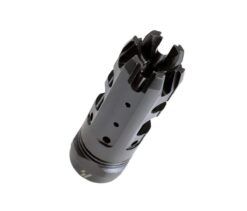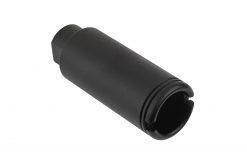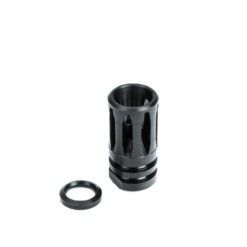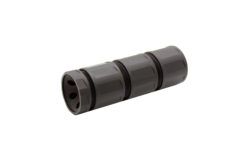AR-15 Muzzle Brakes, Compensators & Flash Hiders
The selection of the right muzzle device for your AR-15 can make a tremendous difference in its overall feel and performance. However, it’s not something we’d ever just toss on the front of our firearm without thought. Let’s take a look at some of the different muzzle devices out there for the AR platform and determine what is best for you.
For the uninitiated, there are three main types of muzzle devices: flash suppressors/flash hiders, compensators, and muzzle brakes. That said, there are also muzzle devices that do not fit into these categories. They are hybrids which attempt to both suppress flash and mitigate recoil. We’ll talk about those near the end of this article. Also, note that we are not covering suppressors here, which in a perfect world, are perhaps the ideal muzzle device if you have the ability to legally attain.
AR-15 Flash Hiders
Let’s start our discussion of muzzle devices with the venerable flash hider. So, just what is a flash hider and why should you consider one for your AR? Also known as flash suppressors, the purpose of this type of muzzle device is to redirect muzzle flash to make it less visible and protect a shooter’s night vision. A high-velocity 5.56 round leaving the muzzle without a muzzle device can be quite the sight to behold. To mitigate this impressive flash signature, many shooters opt for a flash hider on their AR. A flash hider works by rapidly cooling and then dispersing expelled gas, or redirecting the gases that exit the muzzle upon firing. As a bonus, some flash hiders do tend to at least slightly lessen felt recoil.
For many newer builders, a flash hider is what first comes to mind when they think of a muzzle device. Many manufacturers make such devices, but the basic function and idea behind this type of muzzle device remains the same.
Who Should Select a Flash Hider as a Muzzle Device?
As far as who might want to consider a flash hider – there’s a few types of shooters for which a muzzle device like this makes sense. For the budget-conscious builder who is just putting together a simple AR build, an inexpensive but functional muzzle device like a flash hider certainly fits the bill. For many, it might even be wise to start with the flash hider, and then if you find the recoil impulse of your AR-15 is too much, then consider upgrading to a different muzzle device.
Another user who can benefit from a flash hider is someone in law enforcement who is looking to attenuate muzzle flash to protect their night vision. Bad things often happen at night, and preserving your vision in a life-threatening situation is absolutely vital. If I couldn’t have a suppressor on my patrol rife, I’d likely opt for a muzzle device that offered plenty of flash suppression. For that same reason, if you’re building a high-quality, hard-use home defense firearm but do not have the ability to acquire a suppressor, then a flash hider is something we’d most certainly recommend.
Finally, while we prefer suppressors for hunting coyotes and hogs at night, when that is not an option, having an effective flash hider as a muzzle device on your AR is also a good idea. It makes follow-up shots much, much easier. Hunting predators at night, unless you have access to thermal or night vision – well, let’s just say preserving your ability to see is quite important.
Examples of Flash Hiders:
NBS A2 Flash Hider – This black nitride finished flash hider is a great pick for a basic build. With its high-grade steel construction, it reduces flash signature, muzzle rise and has a lifetime warranty. This is a hard one to beat when it comes to the combination of price and effectiveness.
BCM A2X Flash Hider – BCM is known for quality – and their muzzle devices like this flash hider are no exception. The BCM A2X flash hider is machined from 4150 steel and phosphate coated per MIL-STD-171. From a physical standpoint, you’ll notice it is an extended version of the A2 flash hider found on the M16 and M4 series of rifles. What’s great about this flash hider is that when mounted per BATF specifications for a permanent installation, it will bring your 14.5″ M4 barrel to a non-NFA length of over 16.1″. So, if you’re looking to do a basic 14.5″ pin and weld, this is an easy choice.
VG6 DELTA – VG6 designed this flash hider as an alternative to the standard A2. This is a very attractive and well thought out flash hider that looks great once installed. In addition to its flash suppression capabilities, the VG6 DELTA is a muzzle device that also does an excellent job of sending gas down range, thus reducing concussion felt by the shooter. The large, linear ports on this muzzle device also provide a reasonable degree of muzzle control.
NBS Four-Pronged Flash Hider – This muzzle device is a flash hider that features an aggressive profile with four prongs in the front, with four slots to redirect gas and blast. It’s a no-nonsense, high value option that is made of high-quality stainless steel, so it has natural corrosion resistance and durability.
AR-15 Compensators
Moving on from flash hiders – Are you looking for a muzzle device that assists in reducing upward lift or “muzzle flip” when firing? If so, you might want to take a look at what a compensator brings to the table. Simply put, a compensator redirects gases upward and reduces unwanted barrel rise while firing. It does this by venting gases vertically. This can be very helpful when firing off shots in rapid succession. The end result? You’ll have improved control during rapid fire and a tighter overall grouping.
Choosing something like a compensator as a muzzle device is a great way to help you get on target quicker, and put rapid follow-up shots on target. You might also feel a slight reduction in recoil, depending on the compensator, but again, that’s not necessarily the intended effect.
Who Should Select a Compensator as a Muzzle Device?
For most casual shooters who are plinking 5.56 out of an AR, a compensator should not be absolutely necessary. The recoil from a 5.56 is quite mild. That said, if you’re diving into the world of competition shooting, where you’re needing to rip off fast, accurate strings of fire and not wanting to deal with a rifle climbing on you, a compensator just might be the muzzle device for you.
Examples of Compensators:
ODIN Works 5.56 Atlas Compensator – The ATLAS is muzzle device that features a 3-piece modular design that makes installation simple and fast. The core and the cap are machined from 416R stainless steel and black nitrided while the sleeve is made from titanium. Timing and tuning is done with the titanium sleeve, so no shims or crush washers are needed. As a relatively plug-and-play muzzle device for your AR-15, this is certainly on our personal short list.
Strike Industries King Comp – The Strike Industries King Comp features a large dual chamber design, which was engineered to reduce felt recoil and help reduce the side concussion with specifically angled gas ports. The King-Comp is a great alternative if you’re looking for a cross between a compensator and a muzzle brake or effective “combo” muzzle device – so much so, we include this compensator in our list of hybrid muzzle devices later on in this article.
Strike Industries JCOMP Gen2 – Like the King Comp, this muzzle device could be considered a hybrid due to its two-chamber design that helps with recoil management. The J-COMP concept comes from the Type 89 Japanese assault rifle used by the Japan Self-Defense Forces, the Japan Coast Guard’s Special Security Team units, and the Special Assault Team. They’ve had great success with this design, and it’s one we’d definitely consider for a build that we felt needed a compensator. It doesn’t hurt that it’s very cool looking without going overboard.
Strike Industries WarHog Comp – Unlike the pair of two-chamber Strike Industries compensators above, this one is a simple and very affordable single chamber muzzle device. These brakes effectively reduce recoil while maintaining compact dimensions. For the most part, they match the performance of a bulkier design, without the added weight and length. The WarHog provides purely straight-line recoil reduction for those that prefer neutral set ups. As an aside, this is also a pretty striking design. It’s small and looks pretty darn cool once installed.
Strike Industries Checkmate Comp – The Checkmate Comp is designed with a series of four off-set serrated angled prongs which stabilize climb and recoil. The top port set to the right, benefits right-hand shooters with minimizing excessive climb. The aggressive front is an added feature that makes sure no one gets too close, not that you’re likely to be doing muzzle strikes on people.
BCMGUNFIGHTER 5.56 Compensator – BCM is high-quality, and the exterior dimensions of this nitride-treated compensator are consistent with mil-spec for mounting flash hider mounted suppressors. It is designed to have much less side blast and noise associated with typical compensators. As such, the folks next to you at the range might shoot slightly less dirty looks your way.
CMMG SV Brake Compensator – The CMMG SV muzzle compensator is an effective single port brake designed specifically for AR-15 rifles. The large port presents a broad surface for gasses to impact against, which keeps the muzzle down and the sights on target.
Rise Armament RA-701 Compensator – This 416 stainless steel, black nitride finished compensator is designed to counteract recoil and lifting tendencies and helps you stay on target for fast follow-up shots.
KAK Industry 1/2-28 Compensator – Sometimes you want the benefits of a compensator without the muzzle device looking too wild. That’s where this inexpensive compensator shines. The KAK Industry 1/2×28 Compensator maintains the same size as an A2 birdcage while achieving remarkable performance. A closed face and gas ports in the upward position help direct expelled gasses to control muzzle climb and improve follow up shots.
Hiperfire HIPERCOMP 5.56C – Hiperfire is a name that is absolutely huge in the world of competitive shooters. You simply cannot go wrong with this muzzle device. This compensator features a robust, cast design that is ideal for 3-gunners. It tremendously reduces felt recoil and its tip reduces ground effects when shooting prone. From a personal standpoint, this is currently my compensator of choice.
Hiperfire HIPERCOMP 5.56CQ – Another great compensator from Hiperfire that features a four-pronged tip for “close quarters action”, which is interesting as I don’t see many 3-gunners jabbing at cardboard with their muzzle devices…but hey, it’s there if you need it. Regardless, this is a very good-looking, very effective compensator and like everything from Hiperfire, it’s both well thought out and not quite like anything else out there.
AR-15 Muzzle Brakes
Of all the devices I have installed on my ARs over the years, the one thing that has produced more audible “wows” than any other is an effective muzzle brake. The impact that a muzzle brake can have on your AR is hard to overstate.
In the same way that a compensator helps you get back on target quicker…so to can a muzzle brake. It just does so in a slightly different manner. A muzzle brake counteracts rearward force of the AR that occurs when firing. It does this by venting gases to the rear, driving your AR forward in the process. An obvious advantage to muzzle brakes is their ability to reduce recoil and allow you to fire shots in succession with greater control. They also minimize the gun’s movement against your shoulder.
Now, with an AR shooting in 5.56, some would argue that the recoil the rifle produces is more than manageable. And that’s true for many – but for some shooters it’s the little things that matter. One group of shooters that prefer a muzzle device like a muzzle brake are competition shooters. Along with a good trigger, a muzzle brake or compensator is absolutely crucial component for shooters involved in competition shooting with their ARs. Without one, you’re at a distinct disadvantage because they so dramatically help to mitigate recoil.
Concussion Concerns
One thing you should know when it comes to muzzle brakes on an AR – If you select a muzzle brake as your muzzle device, while you’ll have lesser felt recoil, you and the shooters around you may very well notice an increase in sound, as well as concussion. It’s not something that would prevent us from going with a muzzle brake, but it’s at least worth noting. While you’ll love the improved impulse control, the guys at the booth next to you at the range might not be quite so enamored with your AR’s upgraded muzzle device.
Who Should Select a Muzzle Brake as a Muzzle Device?
If flash suppression or the feelings of your shooting buddies to the left and right of you are not major concerns, then a muzzle brake is what I would go with – provided one was within my budget. Anyone looking to change, sometimes dramatically so, the impulse feel of their rifle should consider a muzzle brake. I’d certainly be using a muzzle brake if I was involved in any sort of competition with my AR. I also go with a muzzle break if I know I am going to be shooting a lot of rounds over the course of a day or two. They’re very effective if you are fortunate enough to have an AR capable of full-auto fire.
Examples of Muzzle Brakes:
APOC Armory Black Ops Muzzle Brake – The Black Ops Muzzle Brake is a very affordable design that redirects gasses to help reduce felt recoil and help you stay on target. Each muzzle brake is jet-black nitride treated for superior corrosion resistance.
APOC Armory Competition Muzzle Brake – As its name suggests, the APOC Armory Competition muzzle brake was designed with the competition shooter in mind. Sporting a proven design, these brakes redirect most of the gasses out to the side ports for reduced felt recoil. It also evacuates a portion of the gas out of the top to reduce muzzle rise. The result is faster target acquisition on follow-up shots. Each muzzle brake is black nitride treated for ultimate corrosion resistance and a jet-black finish.
Fortis 5.56MM Muzzle Brake – This 4140-nitride coated steel muzzle brake that helps with both muzzle rise and felt recoil. Like other products from Fortis, it features good looks along with impressive performance.
Fortis Red Nitride Muzzle Brake – Similar to the standard Fortis muzzle brake above, but with a slightly different look. Fortis products don’t disappoint, and this muzzle brake is no exception. As a 3-gunner, this is certainly a muzzle brake to consider.
NBS Tanker – This budget-friendly tanker-style muzzle brake features all-steel construction with a heat treated, erosion resistant black nitride finish.
NBS Three Port Muzzle Brake – This is another affordable brake from NBS that will greatly reduce recoil and muzzle rise on your AR. Precision machined in the USA and backed by the NBS limited lifetime warranty, these are possibly the best value muzzle brake on the market.
Elite Muzzle Brake – This black nitride finished steel muzzle break has a classic design that has proven to work. It most certainly gets the job done in reducing felt recoil on your AR.
Hybrid Muzzle Devices & Blast Deflectors
Now that we’ve gone over the basic types of muzzle device, and the benefits and functions of each – imagine a device that is a hybrid of all of the above. Actually, you don’t have to imagine it, because these sorts of muzzle devices do exist, and are becoming more and more popular with shooters. On the competitive side of the fence, we now see muzzle brakes which can act as compensators. We also see flash hiders combined with muzzle brakes.
In addition, we also see blast deflectors, which are simple concussion-reducing muzzle devices that push blast out and away from the shooter, making for a better overall experience at the range.
Examples of Hybrid Muzzle Devices:
Tiger Rock A2 Stainless Steel Muzzle Brake / Flash Hider – This supremely affordable offering from Tiger Rock is billed as both a muzzle brake and flash hider. This silver birdcage muzzle brake/flash hider with five slots and solid bottom is designed in the standard A2 style. It’s constructed of solid 4150 steel.
VG6 GAMMA – The VG6 GAMMA 556 is a muzzle brake/compensator hybrid, designed to eliminate both recoil and muzzle movement. Its unique chamber geometries give it a very soft feel in the shoulder, and the gas port’s dimensions have been strenuously tested to give the utmost control to the muzzle.
VG6 Precision Epsilon – This is one of our absolute favorite muzzle devices. VG6 Precision’s EPSILON 556 affords you the best muzzle control and recoil mitigation the industry has to offer. This is a true combination muzzle brake / compensator / flash hider. Its performance is matched only by the amazing look of this device. If you don’t mind spending the money, this is probably our pick for a do-it-all muzzle device.
The VG6 Epsilon 556 carries many of the same characteristics as the Gamma 556 with a few exceptions. Extended flash hiding prongs and no ports at the 12 o’clock positions allow uninhibited view from flash through optics or sights. The difference in porting is also noticed on the underside of the device where it has six valve holes to allow the fastest gasses reaching the second chamber to exit. This creates very soft low energy recoil that allows for absolute control.
CMMG SV Brake Compensator – Since the name of this muzzle device indicates it is both a brake and a compensator, we feel compelled to include it here. The CMMG SV muzzle compensator is an effective single port brake designed specifically for AR-15 rifles. The large port presents a broad surface for gasses to impact against, which keeps the muzzle down and the sights on target.
Strike Industries King Comp – The Strike Industries King Comp features a large dual chamber design, which was engineered to reduce felt recoil and help reduce the side concussion with the specifically angled gas ports. The King-Comp is a great alternative if you’re looking for a cross between a compensator and a muzzle brake or effective “combo” muzzle device.
Strike Industries JCOMP Gen2 – Like the King Comp, this could be considered a hybrid due to its two chamber design that helps with recoil management. The J-COMP concept comes from the Type 89 Japanese assault rifle used by the Japan Self-Defense Forces, the Japan Coast Guard’s Special Security Team units, and the Special Assault Team.
Examples of Blast Deflectors:
KAK Industry 1/2-28 Extended Flash Can – The KAK Industry 1/2-28 Standard Extended Flash Can features a simple yet effective flash can design to directs gasses, noise and concussion down-range away from the shooter. This is especially useful when shooting a short-barreled rifle or pistol build.
This extended version, at 5″ long it is a great option for those who are waiting for a suppressor or need to be able to swap between a recessed suppressor and a standard muzzle device for compliance reasons. The slots up front allow the user to torque the recessed flash can without removing the Handguard. There is also a non-extended 3.25″ version available, as well as a “micro” that measures 1.75″ long.
Strike Industries Oppressor – ¬This is a blast shield that works with five different Strike Industry muzzle breaks. Worth considering if that’s the brand of muzzle brake you have selected and you want to reduce concussion on your build.
ODIN Works Atlas Blast Shield – This easy to install blast shield is made of 303 Stainless Steel and it weighs just 1.75 ounces. The Atlas Blast Shield is available in the Black Nitride finish for protection from corrosion, fatigue strength, and resistance to wear. You can also get it in the Stainless-Steel finish to give your rifle that 2-Tone look. The Atlas Blast Shield is compatible with all ODIN Works ATLAS Compensators. On top of working great, the Atlas Blast Shield has a stylish, modern looking design.
Indian Creek Design BFD – While muzzle device blast shields and flash cans are nothing new in the shooting industry, The Indian Creek Design BFD (Blast Forwarding Device) is unique and unmatched in its ability to allow the user to utilize virtually ANY muzzle device from today’s most popular muzzle brakes to the venerable A2 flash hider, and still be able to re-direct concussive forces that occur downrange.
Fortis Control w/ Black Muzzle Brake – Bundle Pack – The Fortis Control Shield was designed to push the noise forward for combative situations or even for simple range use, while the top ports keep the muzzle device flat on target. This package offers the Control Shield and Muzzle Brake as a bundle.
Wrap Up: Which Muzzle Device is for You?
So, in conclusion, how do you choose the correct muzzle device for your next build?
If price is a factor in your decision and muzzle rise and recoil is not a concern, then there is no real harm with simply selecting a flash hider for your build. Especially if it is a firearm that will mostly be used at the range for casual plinking. They’re nice for many reasons, and it’s a great option for a standard home defense gun, where you might be keen to protect your night vision, should something bad go bump in the night. (of course, you’d spot the threat with your weapon light…but that’s a different article for a different day).
If recoil mitigation is a consideration in your build, I would lean towards a compensator or a muzzle brake. While we’ve listed several great options in each category, If I had to pick just one, I might lean towards the Hiperfire HIPERCOMP 5.56C or the wonderful true hybrid – the VG6 Precision Epsilon.
Muzzle Device Questions? Reach out to AR15Discounts.com
As always, if you have any questions about any of the muzzle devices we’ve listed here, please give us a call. Regardless of what you choose, we have you covered at AR15Discounts.com. We also understand that these sorts of topics can be confusing for a beginner. We hope this article helps, but if not, please know we’re more than willing to help and walk you through your muzzle device purchase.


